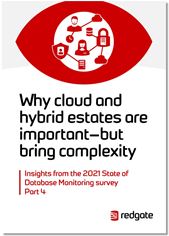The big move to the cloud is bringing as many challenges as opportunities, a major database monitoring survey from Redgate has found. With 80% of organizations now using a mix of cloud and on-premises database environments, the survey shows that the focus of data professionals is shifting to addressing the difficulties of migrating to the cloud ahead of improving the performance of their database estates.
An insights report from the survey shows that 58% of organizations are using the cloud in some way, 22% are exploring it, and just 20% are hosting their database solely on-premises. There is not one cloud, however, there are many, with the 2021 State of the Cloud Report from Flexera revealing that organizations now use an average of 2.6 public clouds and are experimenting with an additional 1.1.

Cloud insights report
As a result, 76% of respondents to the monitoring survey stated monitoring a hybrid database environment was important to their business, up from 44% in the same survey a year earlier. This is further exacerbated by the growth of server estates, with an earlier insights report from the survey showing that 65% of DBAs have seen the number of instances they manage increase over the last year. In previous surveys, the majority stated they managed between one and nine relational databases but in 2021, this rose to 20-49.
The complexity comes when managing and monitoring these multiple databases on many different platforms, whether on-premises or on the big three cloud providers, AWS, Microsoft Azure and Google Cloud. The Flexera report showed that while the majority of organizations have a multi-cloud strategy, only 42% use multi-cloud management tools.
This ties in with Redgate’s survey, which found that only 44% of organizations use paid-for database monitoring tools. A further 35% use tools that are built in-house which, while typically sufficient for small on-premises estates with ten servers or less, cannot handle growing estates, connect to the cloud, or handle multiple cloud environments.
To avoid problems and manage the move to larger, hybrid estates, organizations need a way to monitor everything, from local servers and virtual machines to cloud instances and services, whatever flavor of cloud they opt for. Having one single view of hybrid SQL Server environments is key to keeping processes running efficiently, and moving the focus back to improving the performance of database estates.
As Grant Fritchey, Microsoft Data Platform MVP and Redgate Advocate, concludes: “With all this in mind, as you continue your work in the cloud, or, as you begin your move to the cloud, assume you’re likely to experience a hybrid scenario. Most organizations are going to need to keep an eye on their systems, even though those systems are both on-premises and in some sort of cloud situation. Planning for this hybrid situation just makes the whole process a little easier.”
To find out more, download a free copy of the full insights report, Why cloud and hybrid estates are important—but bring complexity, and contact Redgate to find out how its compliant Database DevOps solutions can help teams deliver value quicker while keeping data safe.
About Redgate Software
Redgate makes ingeniously simple software used by over 800,000 IT professionals around the world and is the leading Database DevOps solutions provider. Redgate’s philosophy is to design highly usable, reliable tools which elegantly solve the problems developers and DBAs face every day and help teams get the most value out of any database, on a growing number of platforms, anywhere. As well as streamlining database development and preventing the database being a bottleneck, this helps organizations introduce data protection by design and by default. As a result, more than 200,000 companies use Redgate tools, including 91% of those in the Fortune 100.
Media Contacts
Meghana Shendrikar
Allison+Partners for Redgate Software
Redgate@allisonpr.com
